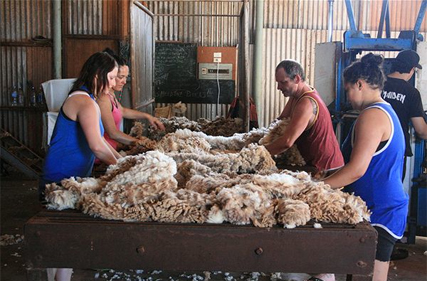 Peak woolgrower representative body WoolProducers Australia have released the final report of the Commonwealth funded Ensuring a sustainable future for Australia’s wool supply chain.
Peak woolgrower representative body WoolProducers Australia have released the final report of the Commonwealth funded Ensuring a sustainable future for Australia’s wool supply chain.WoolProducers successfully applied for a grant under the Commonwealth Governments Agricultural Trade and Market Access Cooperation (ATMAC) grant program, with the intent of looking at domestic and diversified early-stage wool processing as a measure to mitigate some of the trade risk that our heavily reliant wool industry is exposed to
WoolProducers Chief Executive Officer Jo Hall said the wool textile supply chain is one of the most complex agri-product supply chains in the world.
“Given we only have sovereign capacity to domestically process 5% our clip, our heavy reliance on offshore early-stage processing presents some emerging risks that we have been able to assess through the ATMAC grant.
“During recent years WoolProducers have become increasingly concerned about the material impact that trade disruptions could have on our wool market. These disruptions can occur though freight and logistics issues or through the imposition of tariff and non-tariff barriers. One key example of this would be if Australia was to suffer anoutbreak of an Emergency Animal Disease (EAD), such as Foot and Mouth Disease (FMD),” Ms Hall said.
The report outlines the financial impact of various risk scenarios, including the imposition of tariff and non-tariff trade barriers and an EAD incursion. The project found that the capacity to undertake early-stage processing of up to 50% (170 million kg) would reduce the impact on our industry by $1.1 billion in the peak affected year following an outbreak.
In addition to delivering positive trade risk management outcomes the report found that the scouring and carbonising components of early-stage processing were cost-competitive with current supply chains on a cost to customer basis. While labour and energy costs are higher in Australia, there is a significant advantage in terms of freight efficiencies and “days-to-customer” basis.
“The report has shown that onshoring early-stage processing to Australia is a genuine proposition for the global wool industry into the future. Given the significant impact that some of the modelled trade disruptions could have on both the wool industry and the broader Australian economy, it’s certainly worth a further look” Ms Hall said.
Ms Hall also said “An increase of early-stage processing capacity to 170 million kilograms could increase AustralianGDP by up to $1.8 billion and lift employment by 582 full time equivalent jobs. That’s great for our industry, great forregional development and great for the Australian economy.”
The work of the project was undertaken by Deloitte Access Economics, who were guided through the formation ofan industry steering committee. Membership comprised of representatives from WoolProducers Australia, Australian Wool innovation, Australian Council of Wool Exporters and Processors, National Council of Wool Selling Brokers of Australia, Australian Wool Testing Authority and Australian Wool Exchange and Austrade. “WoolProducers are proud to have shown leadership in this space to achieve industry good outcomes and thank the Commonwealth, the industry Steering Committee and those supply chain partners that have participated in consultations. The contributions received from Michell Wool, EP Robinson and Victorian Wool Processors were invaluable.”
WoolProducers looks forward to working with the Commonwealth and industry in the next stages of this work”, Ms Hall said.The final report is available on the WoolProducers website or can be accessed by clicking here.
